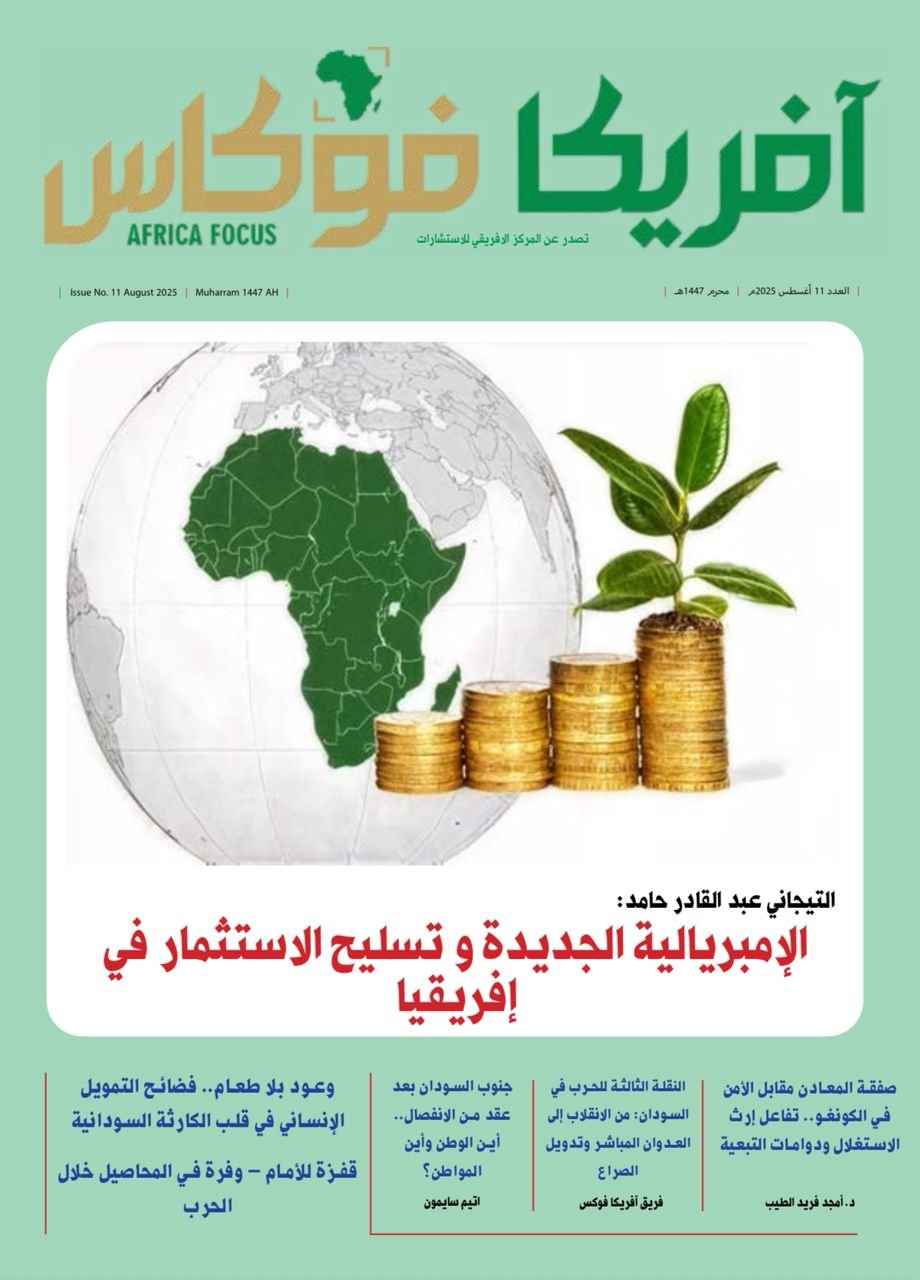The eleventh issue of Africa Focus highlights two main themes:
First, general African affairs in light of both international and domestic transformations that are redrawing the continent’s position in the global order—from new forms of imperialism to political, economic, and security dynamics.
Second, a special focus on Sudan, examining the ongoing war’s wide-ranging social, economic, and humanitarian repercussions, alongside questions of reconciliation, resource governance, and regional actors’ roles.
In the African affairs section, Dr. El-Tayeb Abdel Qader Hamid presents a study titled “New Imperialism and the Weaponization of Investment in Africa”, outlining how tools of influence have shifted from direct military control to the strategic use of capital and investment. He argues that the future of development in Africa depends on the ability of its societies and states to craft autonomous strategies to safeguard their interests.
The issue opens with an analytical report by the African Center for Consultancy titled “UAE Expansion in Africa: Between Ambition and Control”, which explores the UAE’s growing presence on the continent, combining economic, logistical, and military tools in a new model of regional competition.
Along similar lines, the Center also presents a report on the controversial meeting between Donald Trump and African leaders in Washington, titled “Trump Meets African Leaders in Washington: Political Messages and Security-Trade Deals”, analyzing the United States` Africa policy, which now revolves around direct security and trade bargains.
Also featured is a study by researcher Atem Simon titled “South Sudan After a Decade of Separation: Where is the Nation? Where is the Citizen?”, reflecting on the challenges faced by the young state. A decade after independence, it still struggles to establish solid institutions or fulfill the promises of self-rule. Simon asks: Where is the nation, and what happened to the lofty promises?
In another contribution, Dr. Amjad Farid El Tayeb addresses the U.S.–DR Congo strategic agreement in his article titled “Minerals for Security in Congo: Exploitation Legacy and Cycles of Dependency”, examining how the link between natural resources and security continues to reproduce political and economic crises, turning wealth into a source of conflict rather than a driver of stability and development.
In the same vein, writer Abdel Moneim Abou Idris contributes an article titled “Washington Returns to Africa Through the Economy and Under the Banner of Peace”, illustrating how the U.S. seeks to re-establish its strategic foothold in Africa using economic and developmental tools branded as “peace initiatives.” Yet, at their core, these efforts aim to secure American strategic and commercial interests. Combined with Dr. Amjad’s analysis, the two pieces show that Washington is forging a complex equation that blends economics, politics, and security to entrench its presence in Africa.
Researcher Abbas Mohamed Saleh Abbas contributes an article titled “How Did Africa View the Sudanese Crisis? A Reading of Neighboring States and Regional Organizations` Positions”, exploring how various African governments and continental bodies responded to the Sudanese war—revealing how self-interest shaped their stances, even as Sudan continues to need genuine regional support to overcome its crisis.
In the Sudan section, Dr. Abdel Nasser Salim Hamid offers a significant piece titled “Arab Tribes in Darfur After the RSF Defeat: From the Curse of Stigmatization to a Chance for Reconciliation”, highlighting how recent events have reshaped the position of Arab tribes in Darfur. He suggests that despite the difficult moment, it may open opportunities for new social consensus and a return to stability in the region.
In another article by the same author titled “Between the Bridge and the Gun: When the Tribe Becomes a Curse in the Sudanese War”, the role of tribal identity in perpetuating conflict is critically examined.
Meanwhile, the African Center for Consultancy published a special report titled “The Border Triangle: Gateway to Ungoverned Territory and the Geography of Proxy Conflict”, focusing on the border zone between Sudan, Egypt, and Libya. The report depicts this area as a hotspot where local, regional, and international dynamics intersect, making it a critical flashpoint in the evolution of the Sudanese conflict.
On the humanitarian front, the issue features an investigative report by the African Center for Consultancy titled “A Promise Without Food: Humanitarian Funding Scandals Amid Sudan’s Disaster”, which tracks how aid allocated to Sudan failed to reach its intended beneficiaries—uncovering systemic flaws in distribution mechanisms and oversight.
In the reports section, the Center also presents an in-depth reading of the Crop and Food Security Assessment Mission (CFSAM) report issued in March 2025 by the FAO, under the title “A Leap Forward – Agricultural Abundance During War”. The analysis reveals a striking paradox: despite ongoing war and devastation, there was relative abundance in some agricultural outputs—highlighting Sudanese resilience in the face of war-induced collapse.
Altogether, the eleventh issue of Africa Focus weaves together the continent’s grand strategic questions with the intricate details of Sudan’s collapse, underscoring that understanding Africa requires grasping both its internal and external dynamics. The path to the future, the issue suggests, lies in Africans’ ability to turn hardship into opportunity and conflict into blueprints for survival and development.
Africa Focus - Issue (11) - August 2025

